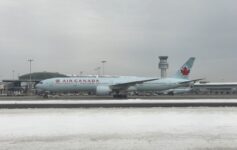Airlines and trade organizations are lining up to fight the new passenger bills of rights in Canada, set to kick in on July 15, 2019.
Air Canada, WestJet, Porter, and the International Air Transport Association (IATA) have filed court papers asserting that Canada’s new air passenger bill of rights runs afoul of established treaties and should be rendered null and void.
The meat of the complaint is that this bill of rights contravenes the Montreal Convention, an international agreement regulating compensation for delays, cancellations, and lost luggage. Canadian airlines and IATA view the new bills of rights as particularly poor policy because compensation is awarded “irrespective of the actual damage suffered.” The airlines further assert that the new bill of rights causes passenger confusion.
Starting next Monday (15 July), the first phase of the bill of rights is scheduled to kick in. That includes:
- Up to C$2,400 for denied boarding due to an oversold flight
- Up to C$2,100 for lost or damaged bags.
The second phase will kick in later in December and will include payments of up to C$1,000 for flight delays.
The President of the Air Transport Association of Canada, John McKenna, told the CBC:
They’re trying to meet international standards and do better, and I don’t see why. We’ve been complaining about that from the start, that this is going to drive up the price of flying in Canada.
Uh, yeah…that’s the point…exceed the bare minimum. Will it drive prices up? The cost of flying in Europe, where EU261/2004 is in force, suggests the answer is no.
Legally, Airlines Have One Prayer Only
Looking at this from a legal perspective, the idea that the new Canadian law runs afoul of the international treaties and law is just poor legal reasoning. Under Canadian law, the applicability of international treaties is determined by the extent to which the legislature incorporates them into Canadian law.
While the Montreal Convention has been established in Canadian law, it does not fully cover all the areas (like domestic baggage) that the new bill of rights covers. Thus, where not in direct conflict, the Montreal Convention and the new bill of rights can peacefully coexist.
But while I view that as a losing legal argument, airlines may have a claim that the new law unfairly makes a distinction between large carriers and small carriers. In its court filing, IATA argued this constituted “differential treatment … without any statutory authorization for such discrimination.” That said, Canada need only demonstrate a rational basis for distinguishing between small and large carriers.
A Huge Loophole
Airlines really should just shut up at take it, for they have an exception a mile long that can get them out of paying compensation.
The new bill of rights stipulates that technical problems discovered during a pre-flight check do not trigger mandatory compensation. Weather is also exempted.
Think about it…how can you prove otherwise if an airline says your flight is delayed due to mechanical issues? It’s like a carte balance for the airlines to avoid paying…make every non-weather delay a mechanical delay and voila!, no compensation is due. And how will consumers force airline to pay when compensation is explicitly warranted? That’s still being worked out.
CONCLUSION
The Canadian Transportation Agency will respond to the court filing later today. In the meantime, airlines like Air Canada and Westjet are hoping for a preliminary injunction before next week.
What are your thoughts on the new Canadian Passenger Bill of Rights for air travelers?




You’re missing a substantial piece of the legal question in your analysis.
The Montreal Convention only applies to international carriage between party nations. The Convention is ratified by Canadian law in its entirety. It is well established domestic and international jurisprudence that the Convention is supreme and any law that interferes in any way with the Convention is void under the concept of preemption.
The legislature has jurisdiction to create law that does not overlap with the Convention. For example, baggage compensation for domestic travel is not covered by the Convention and is subject to national law. Therefore, domestic baggage compensation rules in the Bill of Rights are intra vires. However, if the luggage rules impacted international travel, they would be ultra vires as the Convention applies. This is similar to delay – the Convention has a compensatory scheme for flight delay, so compensation for domestic delay is fine but not for international delay.
Very helpful, as this is not my area of expertise. I’ve clarified that section above. So when passenger rights groups say that the legislature can pass legislation that supersedes the Montreal Convention, you’re saying that is impossible?
Correct. The Montreal Convention is preemptive (excludes overriding law). Ratifying states can’t create legislation that conflicts with the Convention. If it does, it’s null. As the Convention only deals with international travel, not domestic travel, states are free to create legislation constrained by the constitutions for matters relating to purely domestic travel. You can’t ever make a Convention claim on a purely domestic itinerary.
I attended an ICAO seminar on the Convention a few years ago. There, we were told that it is regarded as one of the most successful treaties, in part due to global recognition of its jurisprudence and exclusivity. While there are marginal cases that debate the complete exclusivity of the Convention, namely in the United States, courts around the world generally look to global jurisprudence, which supports preemption, to decide Convention claims.
The Canadian law is seriously weak tea. As you mentioned, there are such easy ways to avoid paying that it’s near worthless. The Canadians – and the US – need to implement laws equal to or stronger than the EU for consumer protections when flying.
Can someone clarify this for me please? I fly to Toronto and back once or twice a year, usually on Delta. Would this compensation only apply to me on my flight leaving Toronto? Only if I’m flying on a Canadian airline?